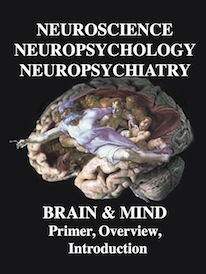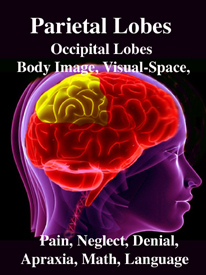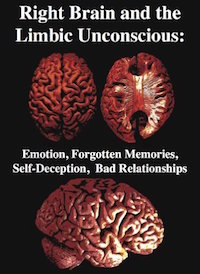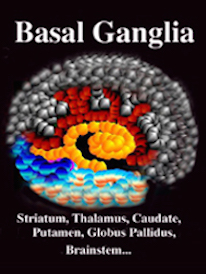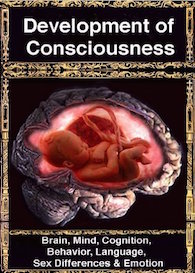Consultations, Advice, Answers
R. Gabriel Joseph, Ph.D.
BrainMind.com
Self Deception and Confabulation
He knows it, because he believes it.
Believes it, because he knows.
But alas, he knows only that he believes.
CONFABULATION
The non-emotional aspects of language, that is, the temporal-sequential, grammatical and denotative aspects of speech, are localized in the left half of the brain, in the majority of the population. Whereas the right hemisphere is dominant for the social-emotional and melodic aspects of speech--that is, the way things are said--the left hemisphere mediates what is said, the words of speech and their grammatical organization.
Three unique areas in the left hemisphere which maintain speech. Broca's Expressive Speech area--which does the talking; Wernicke's Receptive Speech area--which does the listening; the Angular gyrus of the inferior parietal lobe, which assimilates verbal associations so that they may be understood; e.g., so that we know that the word "green" represents a color, or a state of not yet being ripe or untested, as well as a political group.
These three area, the angular gyrus/inferior parietal lobe, and Broca's and Wernicke's areas, form a "Language Axis." The Language axis maintains the verbal aspects of the conscious mind.
When the Language Axis (Wernicke's and Broca's area, the Angular gyrus) and thus the linguistic conscious mind become isolated or are prevented from receiving information from yet other regions of the psyche, an individual may begin to engage in denial, projections, rationalization, and displacement. However, when a brain injury causes a disconnection of the Language Axis from yet other areas of the brain and mind, the person may engage in denial, including the production of elaborate confabulations, denying the existence of the left half of the body, or claiming he can see when he cannot.
As previously noted, patients who have sustained injuries involving the right brain and who are subsequently paralyzed on the left side, may claim that their paralyzed extremities belong to the doctor or a person in the next room. This is because a bilateral image of the body is represented in the neocortex of the parietal lobe of the right hemisphere, whereas it is the left hemisphere which is doing the talking. In less extreme cases the speaking half of the brain may claim that their paralyzed limbs are normal even when they are unable to comply with requests to move them.
For example, one women "when asked why she could not move her arm replied, "somebody has a hold of it." Another patient, when asked if anything was wrong with her arm said, "I think it's the weather. It's just a little cold and stiff. I could warm it up and it would be all right." One women whose left leg was paralyzed continued to claim she could walk, even when she obviously could not. "I can walk at home," she stated, "but not here. It's slippery here." Another patient claimed that he could not raise his arm because of the stiff shirt he was wearing.
With severe right cerebral injuries (which in turn results in a massive reduction in information exchange between the two halves of the brain), the individual may make up extremely bizarre explanations regarding their injuries, which they seem to believe. For example, one patient who had suffered burns as well as a significant brain injury in an auto accident claimed that his rocket ship had crashed which resulted in an atomic explosion. He repeatedly insisted he was filled with radioactive fluid and thought that his various scars were the result of this fluid being removed from his body. However, his responses were not due to some form of psychosis, they were the product of a loss of inhibitory restraint and confabulation, an attempt to make sense of what he was experiencing.
Yet another patient who had received a gun shot wound to the right brain repeatedly and vehemently complained about being kept in a hospital which he believed was due to a plot by the government to steal his inventions and ideas --he had been a grocery store clerk. When it was pointed out that he had undergone surgery for removal of the bone fragments and the bullet, he pointed to his head and replied, "That's how they're stealing my ideas."
Moreover, these confabulators truly believe their own stories and will sometimes adamantly argue if you try to persuade them otherwise. Rather than relinquishing an incorrect belief when confronted with contradictory information, these individuals will sometimes simply adjust their story slightly.
In fact, the same thing often occurs when information stored in memory (be it in the right or left brain), is not available to the Language Axis and the conscious mind. Take for example a patient who was suffering from a partial amnesia and who although having been a patient for over two weeks, had no recall of why he was in the hospital. However, he could accurately recall much of what had occurred prior to the onset of his condition. When the nursing staff attempted to provide him with medication, he would respond, "What is this for? I've got to get out of here." or "I just stopped by for a checkup. I've got to get back to work." When I informed him he had been a patient for over two weeks he became very hostile and upset, and angrily replied, "I just came here for lunch. I do not belong here. I'm supposed to work in the garage. Now would you please tell me how to get to the garage?"
Essentially, the left half of the brain, being denied access to various sources of information, responds to the gap in the information received, with ideas and associations which are available, even when irrelevant or ridiculous. There is a failure to correct these erroneous statements as disconfirming evidence is not available to it. The Language Axis and the conscious mind have essentially been disconnected without knowing it and thus act to fill the gaps in the incomplete messages received with ideas which are related in some manner to the fragments available.
When the conscious mind is disconnected from another brain area, due to injury or a functional, psychic resistance or repression, then the Language Axis with which it is closely associated, will be unable to describe what is going on in that cerebral region. Instead it will describe only what is available to it; which it then believes. Moreover, it will not know that it does not know, or that it's explanations are erroneous, because that area of the brain which does know, has either been destroyed, or psychologically disconnected, and cannot alert the Language Axis to any discrepancies.
In extremely severe and rare cases of brain injury, the Language Axis and conscious mind, can become completely disconnected from the rest of the cerebrum such that almost no information is available to it. When this occurs, the associations available are so limited that it cannot think, cannot act, and can only respond to the most simple of questions in a stereotyped and very limited manner. However, the right brain may still engage in singing, praying, and engaging in it's normal routine; that is, if it is not too severely damaged.
In an interesting case described by Drs. N. Geschwind, F.A. Quadfasel and J.M. Segarra, a 22 year old woman with massive destruction of neocortical tissue due to gas asphyxiation was found to have a preserved Language Axis with all surrounding brain tissue destroyed, thus completely disconnecting it from the rest of the cerebrum. It was noted once the patient regained "consciousness" that "she sang songs and repeated statements made by the physicians. However, she would follow no commands, resisted passive movements of her extremities, and would become markedly agitated and sometimes injured hospital personnel." In all other regards, however, she was completely without comprehension or the ability to communicate. "The patients spontaneous speech was limited to a few stereotyped phrases, such as "Hi daddy," "So can daddy," "Mother," or "Dirty bastard." She never uttered a sentence of propositional speech over the nine years of observation. She never asked for anything and she never replied to questions and showed no evidence of having comprehended anything said to her. Occasionally, however, when the examiner said, "Ask me no questions," she would reply "I'll tell you no lies," or when told, "close your eyes" she might say "go to sleep." When asked, "Is this a rose?" she might say, "roses are red, violets are blue, sugar is sweet and so are you." To the word "Coffee" she sometimes said, "I love coffee, I love tea, I love the girls and the girls love me."
"An even more striking phenomenon was observed early in the patient's illness. She would sing along with songs or musical commercials sung over the radio or would recite prayers along with the priest during religious broadcasts. If a record of a familiar song was played the patient would sing along with it. If the records was stopped she would continue singing correctly both words and music for another few lines and then stop. If the examiner kept humming the tune the patient would continue singing the words to the end. New songs were played to her and it was found she could learn these as evidenced by her ability to sing a few lines correctly after the record had been stopped. Furthermore, she could sing two different sets of words to the same melody." In other words, although the Language Axis was disconnected, the right brain (although also damaged) was still able to engage in some of its normal expressive routines, singing and praying. The left brain, however, being totally isolated, could produce almost nothing except well learned and stereotyped phrases. In other words, the left brain could only repeat what was available to it.
Such conditions are quite rare, however. Nevertheless, even when the brain has not been damaged the Language Axis is not always able to gain access to other brain areas. When this occurs it will make up explanations as the need arises, even when the brain is not damaged. One need not suffer a brain injury in order to confabulate; it is a normal part of left brain psychic functioning.
Quite frequently, due to one's conscious self-concept, or other concerns, information which is available but undesirable, will sometimes be suppressed, ignored, or denied. When this occurs, the Language Axis, and the conscious mind can then generate whatever explanation it wishes to explain away its actions, feelings, behavior, or the behavior and feelings of others. Having no access to the correct information, perceptions, memories, and emotions, it cannot be alerted, except indirectly (via the generation of tension) to any discrepancies, unless, of course, the right brain or limbic system completely overwhelms it or takes over. However, even then the left brain may be denied or deny itself access to whatever motivated its behavior, and like the brain injured individuals discussed above, will generate whatever explanation that is acceptable, even if unplausible or ridiculous.
HIDING INFORMATION FROM THE CONSCIOUS SELF
Desires, impulses, and a variety of emotions arising from the realms of the unconscious may come to be reinterpreted or defended against in a variety of ways. Some desires just fade away or are replaced by more important concerns. Others simply cannot be perceived or even recognized by one versus a second region of the brain or mind. Others are held in check, via the frontal lobes for example, until an appropriate time or means of fulfilling them emerges.
However, some tendencies and personal characteristics are pervasive and deeply ingrained. They are part of what and who we are. Sometimes these personal traits are largely unconscious and associated with the unconscious self-image, such as the ego personality of the Child. This constellation of traits may include feelings of hurt, jealousy, anger, guilt, cowardice, weakness, incompetence, clumsiness, fearfulness, childishness, and even feelings of selfishness and greed such as often occurs when children are spoiled.
Although accepted by the unconscious self-image, these unconscious tendencies may be completely unacceptable to the conscious self-image; what we have described as the adult Self, or Adult Ego personality. Being unacceptable they are ignored, denied, projected onto others or inhibited. At a conscious level a person may not even know he possesses these traits.
Indeed, many of us have had experiences where a good friend or lover has behaved in a selfish or inconsiderate manner. However, when we have complained or confronted him or her they may have steadfastly denied ever having behaved in this fashion and will vehemently deny even possessing such disagreeable tendencies. Incredibly he will deny what is obvious to us, and he will believe his own denials. Essentially, the Language Axis and the conscious mind have become disconnected from these sources of undesirable input. When the left brain tells these "lies," it is in fact telling the truth as it perceives it.
DENIAL. When unconscious needs, desires, personality traits or tendencies are contrary or upsetting to the conscious self-image the person may go to great lengths to suppress, deny, compensate or overcome them. Even when a person has engaged in some action which is contrary to his conscious self-image he may deceive himself into believing that it did not occur, and that it was a minor aberration which means nothing.
If he is shocked by what he has done or said, he may shrug it off with a simple: "I didn't mean it," "I was tired," "I was drunk," or "I don't know what came over me," as if some alien force took over his brain for a few minutes. These are defense mechanisms employed by the conscious mind and are referred to as "rationalization," "denial," "justification," and "self-deception."
SELF-DECEPTION
DENIAL & BELIEVING YOUR OWN LIES
It can be said that a person has lied when he knowingly possesses the truth and consciously attempts to deceive another person. Yet, curiously it sometimes happens that a person half persuades himself that the lie he has told is true and then behaves accordingly. When this occurs we may complain that he "believes his own lies." He has engaged in the production of confabulations.
Consciously we often attempt to hide disagreeable information from ourselves. This includes unconscious personal traits and tendencies that consciously we find disagreeable. Sometimes these characteristics are too difficult to confront consciously.
Denial, however, does not make a desire, impulse or personal short-coming vanish. Often we remain unconsciously-aware of its presence. Moreover, via the generation of various associated tensions and feelings the conscious mind continues to be influenced if not controlled by these unconscious forces. The person may even act on these impulses and not know why or "what came over them." Feeling these tensions or observing their actions the left half of the brain may then confabulate explanations as to why they did and said such and such.
It is precisely because of these "mysterious behaviors," emotional tensions and influences including the dual nature of our brain and mind that the left half of the brain must engage in denial in the first place. The person is aware of what he is hiding. To deny something means to simultaneous know that it exists. You cannot deny something without being confronted by it in the first place.
Hence, whenever a person attempts to deny or hide information from himself he is simultaneously acknowledging that they have an awareness of how and why the information is threatening. "John" would not deny and hide information from himself if he did not know simultaneously that it would bother him. However, it is the right brain which knows and the left brain which is in denial. How is this made possible, via the frontal lobes, which as noted, are the senior executive of the personality and the Ego, and which exert significant inhibitory restraint on information processing within the brain.
SELF-DECEPTION
The dual organization of the human brain and mind allows for the development of countless conflicts some of which are resolved by denial, projection, or self-deception. Because we have two brains we can know, yet not know, and can lie and deceive ourselves about our own unconscious tendencies and impulses.
Alan was pampered and spoiled by his two fairly well off, but not quite rich parents, particularly his mother who took a special delight in indulging her son. Although the second son in a family of 6, he remained the apple of their eye and remained so, even after he had been placed on trial for rape. Paradoxically (or so it seems), he always felt angry at his parents whom he believed never did enough for him. Unconsciously, he always felt cheated, even though he was the only one of their four children who never had to hold a job and had his way paid through college. He held his mother in particular contempt as he could recall several instances where he had to beg or plead for some special toy or favor before she would yield. In other words, he was the typical spoiled child who took love and affection for granted but was reluctant to return it, in part because of feeling cheated, but mostly because it had never been required in order for him to win favor. His unconscious Child, therefore, was thus quite selfish and greedy, and his unconscious Parent told him he deserved to have his own way.
His unconscious resentment, however, soon came to include most others for although highly intelligent, being a very short, thin and frail individual, he was often left out or was the last to be chosen for sports and games at school, and had never had a girlfriend or a date until he became a graduate student in college. He claimed, however, that this did not bother him because most people were idiots, women in particular. Moreover, he thought quite highly of himself and claimed to be a strong believer in fair play and honesty; that is, so long as he was treated in kind. Hence, his conscious self image was that of a "great guy." Indeed, this was the conscious message he always received form his parents, his mother in particular.
However, by his own admission, he stated that all women were selfish, mean spirited, untrustworthy bitches and whores, who would do anything to "clip a guy" and "screw men over." The only thing they were good for was sex, and insofar as he was concern, he could take them or leave them.
Nevertheless, much to his pleasant surprise, as a graduate student and teaching assistant, undergraduate females began to show him some interest which he exploited miserably up until he was arrested for rape. This came as a crushing surprise and confirmed his worst fears about women, as by his own admission he had acted no different with her than he had with several other undergraduate students that year.
"The prick teasing bitch wanted it," he told me, and he could not see what he had done that was wrong. "She knew what was going on. She hardly struggled. She didn't scream. If she didn't want sex, why did she come to my house? Like all women she just wants it both ways. Get what she can and then screw everybody else. I'm the one who is getting raped. You just can't trust women. They try to trick you and deceive you, and then take everything you got without giving you anything in return except grief. I just can't believe this is happening to me."
According to Allen it was one of his typical first dates. He had taken her to a drive in movie where he plied her with malt liquor followed by "whisky chasers." Once he was sure she was fairly intoxicated they left the movie and returned to his apartment where the drinking resumed. When he was sure she was too intoxicated to resist he began removing her clothes. Although, she still had enough wherewithal to try to resist and beg him to stop, he "knew" that she really meant "yes" and simply ignored her protests and, over powering her, took his pleasure.
When I tried to point out that all the cruel things he ascribed to women in general, actually fit his own behavior (e.g. untrustworthy, take advantage, screw someone over), he became angry and stated that this is what she had done to him by pressing the rape charges. He had only engaged in a normal manly manner, and had seduced her.
In actuality, however, he had seduced himself. He believed his own lies and had projected his own horrible tendencies onto women in general. This allowed him to justify and rationalize his mistreatment of them, while simultaneously meeting the needs of his Child and enhancing his poor self image and conscious feelings of masculine superiority in the process. Nevertheless, he was so disconnected and cut off from his true self image and selfish tendencies that he was unable to recognize his actions for what they were, and, he believed his rationalizations and explanations.
Even when I asked him how he would feel if he went out with some men, became very intoxicated, and was then sodomized or forced to engage in oral copulation, he could not see the connection. "Men don't do that to each other," he stated, "unless they're both queers, in which case it is OK."
Dr. J:" It's OK when someone is too intoxicated to resist or to know what's going on?"
Allan: "Hey. She could talk. She could walk. So what she was drunk. I didn't rape her. I seduced her. Nobody forced her to keep drinking." Dr. J: "Your 25. She's 17. Who supplied her with the drinks? Who got her so drunk she could barely resist?"
Allan: "Hey, man. That's the way its done. You have a sex problem or something?"
Dr. J: "No. I have a problem with rape."
Allan: "Rape! I didn't use force. I didn't beat her up."
Dr. J: "Sure you did. You used the force of alcohol. You numbed her brain so that she hardly knew what was going on. It sure wasn't your sparkling personality which got her into that bed. You might as well have hit her with the bottle."
KNOWING YET NOT KNOWING: SEDUCTION AND SELF-DECEPTION
Melody has a conservative background and well meaning upper middle class, semi-religious parents, who have impressed upon her the need to maintain certain values and morals. Melody is in her first semester at college and is living in the dorm. One day a handsome, muscular, sexy, upper classman whom she has seen about campus, invites her out. She consents. They have dinner, stop at a local nightclub, dance close together and have a drink. So far it has been an exciting, romantic evening.
On the way back to the dorm he invites her to stop by his place to "check out the new CD player and stereo equipment" he has just purchased. She knows, or rather, is aware of the possibility of his intentions and what he may really be up to. Indeed, the look in his eyes, his tone of voice and body language have made his real interests completely clear to the right half of her brain long before they even began dinner. However, insofar as her left brain is concerned this guy just wants to show her his stereo. Due to this awareness of his intentions including the manner in which she may respond, the left brain begins to invent and think up reasons why this is OK. He seems real nice. They had a real good time. He has not acted inappropriately. Why not?
Once at his home he makes certain advances; sitting close to her, looking in her eyes, he tells her she is "really beautiful." Her right brain responding to his tone, body language, etc., is now almost certain of his desires and what he means by his words. Moreover, she is not only aware of what might occur next, she is also aware that she may have to make a decision regarding this. However, she does not want to "think about that" (she is a nice girl).
Due to her conscious Self-image this information is suppressed and ignored. The left brain does not gain access to what the right brain is fully aware of. The left brain thinks: this guy is only being nice.
Slowly he places his hand on her knee. The act risks changing the situation by calling for an acknowledgement and an immediate decision as to its meaning. To leave his hand there is to consent, to acquiesce to his desires and to consciously acknowledge them willingly. Yet to withdraw his hand is not only a recognition of what it implies, but a refusal. Her aim is to postpone her decision, to stall conscious recognition. She has "no idea" as to what he is up to. She leaves his hand there because she "doesn't notice it."
And yet, as they talk, he has moved closer to her, his hand inching its way past her knee. But she is concentrating on what he is saying, the curve of his lips, the white of his teeth, her reply to his questions; this is what she is conscious of and to what she addresses herself. She reacts as a personality that does not know that a hand lies there upon her leg. She is being seduced.
She is also being self-deceived. She has restricted her consciousness and her thoughts to only selective aspects of what is occurring. She is failing to acknowledge consciously what she is fully aware of. Nevertheless, she is aware that his actions are sexual and has been aware of everything that might occur since the moment he asked her out.
However, if someone were to have told her this guy would bring her home and make possible sexual advances, she would have turned down the date. After all, her conscious self-image is that of a "good girl," a "nice girl." Although she is not a "prude," as she has always told her friends, she will have sex only with a man that she loves. Indeed, the possibility of "sex" was so far from her (conscious) mind that it never even occurred to her that this guy would make certain advances.
So why did she go out with him? Why is she not taking his hand and indicating that his behavior is not acceptable: "Please stop." One would have to assume that her limbic system was "turned on," she was sexually attracted to him and the possibility of his making sexual advances was not only acceptable but welcome; at least on an unconscious level. However, what is acceptable at an unconscious level is not acceptable to her conscious mind and conscious self-image. Unconsciously she is in fact yielding to his and her desires. Consciously she still does not know what is going on. His behavior seems harmless.
If we accept Jean Paul Sartre's position 1, there is a possible unity in a situation such as this, for her actions necessitate a recognition of the intentions of her male friend as well as a disavowal. Otherwise she would have asked: "What is your hand doing on my thigh? Please remove it." Indeed, even if unable to verbalize her conscious disproval (as some young women presumably become too intimidated to speak up) she would have made some attempt to back off or disengage herself if that is not what she wanted. However, consciously she is disconnected from what is really occurring and from what she is fully aware of, so she does nothing.
This is the beauty of self-deception, it allows a person to engage in a certain behavior while simultaneously preserving his conscious self-image. It preserves the possibility of an event occurring or a desire being acted upon while acting as if the event or action is not occurring.
Unconsciously a person may be fully aware of what he is doing or intends to do, while consciously he may behave as if nothing of the sort were going to occur. This allows a person to deceive himself into thinking he is not responsible for his own behavior or for what happens.
He takes her hand, leans close and kisses Melody upon the lips. The kiss takes her by "surprise." He snakes his other arm around her and kisses her again. She does not know what to do. She is confused. And yet, her limbic system is proclaiming: "I want it now!", her right brain is saying: "go for it," and the left brain in all innocence is saying: "What's going on?" He begins kissing and touching her passionately and she feels herself yielding as her Limbic System begins to overwhelm her conscious inhibitions. Her limbic system, in effect, has taken over, and her left brain, essentially, has gone "off line," and is now a passive observer to behavior over which it has no control.
Indeed, it often happens that people behave in a certain manner, or say certain things that are shocking even to themselves. They don't know "what came over" them. They may see themselves as moral, just, kind, loving, and for some unknown reason act in a cruel, selfish, sexual or spontaneous manner and yet retain the conviction that what they have done or said is not a true representation of how they really feel or who they really are. Often, however, once the limbic system has been satisfied and left brain regains dominance it may then begin to impose and cause feelings of guilt on itself.
Their left brain may then begin to confabulate explanations so as to defend their conscious self from the truth or to minimize these self induced feelings of unnecessary guilt. Such behavior, they reason has an explanation outside themselves, being only a rare and momentary lapse, is justified by certain mitigating circumstances or is due to the horrible shocking behavior of someone else: "They pushed me too far that time!"
And, if Melody was "taken advantaged of" by "that rat," "that scoundrel," "that womanizer," then she is of course not responsible for what happened. She "had no idea as to what he was up to," or that "he was that kind of guy." And, besides she "had too much to drink," (although she in fact had only one) and "was too tired to fight him off," (although she never tried) and before she "knew it, it was too late," and so on. Her conscious self-image remains untarnished. She is free of conscious guilt. As pointed out by Sartre, she has deceived herself. And yet, she knows and is aware of the truth. It is precisely because she knows that she invents innumerable excuses for her behavior.
Fortunately, for all concerned, however, "that rat" called her the very next day and brought over a dozen roses. She was enthralled, they began dating, and he turned out to be not such a bad guy after all.
PROJECTION
Consciously we often attempt to hide unpleasant information from ourselves. This includes personal traits and tendencies that consciously we find disagreeable. We also sometimes fail to consciously recognize certain disagreeable traits possessed by others, such as loved ones and potential mates. Sometimes these characteristics are too difficult to face. This is why it is said that "love is blind." However, within the domain of the right half of the brain we are often completely aware of the presence of these personality features, whether they are possessed by others or ourselves.
As pertaining to a potential mate or when meeting someone attractive, who is nevertheless flawed in some manner, this awareness may be realized in the form of a "gut feeling," "alarm bells," and other warning signs, that are of course ignored (by the conscious mind) until it is too late. It is only later, after we have been repeatedly hurt, used, or abused that we become conscious of what we were aware of. It is at this point that our good friends also begin to cheerfully remind us: "I told you so!" And we know they are right. We in fact were aware of it the whole time. The knowledge, however, was unconscious and part of the domain of what we have referred to as the unconscious-awareness of the right half of the brain.
KNOWING YET NOT KNOWING
Denial and self-deception often imply a knowing coupled with a not knowing . Although the right brain may know, the left brain is in the dark as to what is actually occurring. However, ignorance may not be bliss, as the left brain is still subject to tensions associated with these needs and desires, and may correspondingly experience some degree of discomfort.
Although information exchange between the two halves of the brain or the limbic system and the rest of the cerebrum may be incomplete and prevented to various degrees, there is often a seepage of information from one mental system to another. Even though, as we've seen, information may be incomplete and possibly misinterpreted and mistranslated, that seepage, coupled with the experience of tension, arousal, and any other associated feelings, often alerts the left brain to the possibility that certain information may be unpleasant and disagreeable. This initiates the activation of various defense mechanisms. A person is thus able to protect himself from gaining complete conscious knowledge by engaging in denial, self-deception, or through the confabulation of various explanations and justifications.
Indeed, even when we act on these impulses and desires, make the cruel comment, do and say the wrong thing, the left brain and conscious mind is still able to disavow what is obvious. It makes up reasons, rationalizes, justifies, denies, or even projects blame onto someone else. When others are blamed or when traits which we unconsciously possess are thought to be possessed by someone other than ourselves (such as in the case of Allan the rapist), we have engaged in projection. "Projections change the world into a replica of one's own unknown face."
